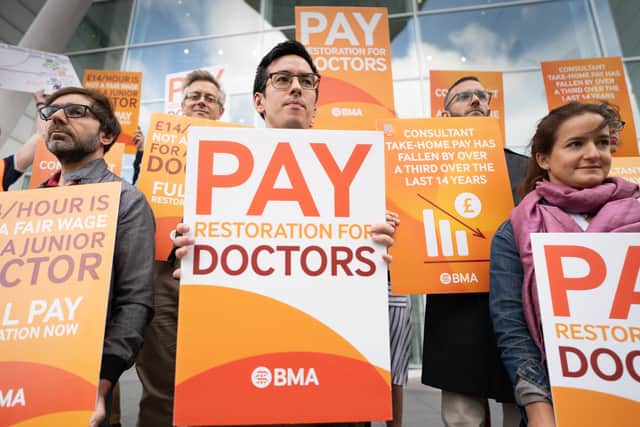NHS strikes: junior doctors and consultants begin joint three-day action as pay dispute continues
and live on Freeview channel 276
Thousands of junior doctors and consultants at the NHS have begun their three-day join strike action, with warnings that non-emergency care will be brought to almost a complete halt.
Members of the British Medical Association (BMA) voted in favour of more strike action as the dispute around pay rumbles on. The action will take place from 7am on Monday 2 October and will finish at 7am on Thursday 5 October.
Advertisement
Hide AdAdvertisement
Hide AdBoth sets of staff have said that "Christmas Day" levels of staffing will be in operation throughout the strike. A previous joint strike in September, the first of its kind in the history of the NHS, led to around 130,000 inpatient and outpatient appointments being rescheduled.
The government has urged NHS staff to end "relentless" strike action, adding that doctors have been offered a "fair and reasonable" pay rise in negotiations.
Health and Social Care Secretary Steve Barclay said: “I’m deeply disappointed and concerned by further co-ordinated strike action which poses continued challenges for the NHS and disruption for patients, and means more will have vital treatment and care delayed.
“I urge unions to end their relentless strike action. Doctors have received a fair and reasonable pay rise – as recommended by the independent pay review body, which we’ve accepted in full.”
Advertisement
Hide AdAdvertisement
Hide Ad

The BMA has said that doctors, many of whom are taking part in the strike action, are "fed up" of being made the scapegoat for issues affecting the NHS, including long waiting lists.
In a new survey of around 1,765 adults, it was shown that the majority of respondents blame the government for the "cripplingly long" waiting lists currently putting the NHS under pressure. More than two in five adults blamed the government for an increase in waiting lists for elective treatments in England, which have ballooned from 2.6 million in 2010 to 7.7 million.
On the flip side of this, only 15% of respondents said that striking doctors are to blame for the lengthy waiting lists.
Professor Phil Banfield, the BMA chair of council, said: “Doctors are fed up of being told we are the problem with the NHS.”
Advertisement
Hide AdAdvertisement
Hide AdHe added: “It is not fair for the Government to continue to blame doctors or other healthcare workers for their own failure to properly resource the health service in England.
“What we see today is that the public largely sees through that excuse. Many more appointments and operations are cancelled outside the strike days because of a shortage of beds, staff or operating capacity due to the relative chronic underfunding.”
Dr Sarah Clarke, president of the Royal College of Physicians, said: “The decision to strike is a difficult one – no doctor will be taking this action lightly. But doctors feel undervalued, overworked and under-resourced to deliver the care they want to provide.
“We must see an end to this dispute, and we urge the Government to take the lead to end the impact on patient care.”
Advertisement
Hide AdAdvertisement
Hide AdNHS officials have warned that the new three-day strike, described as a "worrying escalation", could mean "delay, disappointment and disruption for tens of thousands of patients". Deputy chief executive Saffron Cordery said: “This stalemate can’t continue. Especially as we approach winter – the toughest time of the year for the NHS.
“All parties involved need to engage in meaningful talks to find a resolution that safeguards patient care, minimises financial impact and promotes staff wellbeing.”
NHS England has said that "thousands" more appointments are expected to be rescheduled over the next few days. It comes after the total number of postponed appointments topped one million since strike action by NHS staff began.
NHS national medical director Professor Sir Stephen Powis said: “NHS services have had very little time to recover from the previous action, and to now face an unprecedented three consecutive days of ‘Christmas Day’ cover this week will prove extremely challenging, with almost all routine care brought to a near standstill.”
Comment Guidelines
National World encourages reader discussion on our stories. User feedback, insights and back-and-forth exchanges add a rich layer of context to reporting. Please review our Community Guidelines before commenting.
